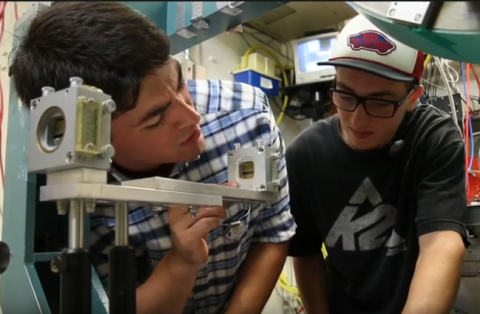We are inviting New York State community college students who are U.S. citizens or permanent residents to apply for our Summer Engineering and Research for Community College Students (SERCCS) program. Through this program, students interested in a career in science, engineering, and technology have the opportunity to participate in research and development projects at the Center for High-Energy X-ray Sciences (CHEXS) at Cornell.
Participants will receive a stipend. Local group housing will be provided through Cornell University Campus life, if the program can be held in-person and participants prefer not to commute daily.
In the summer of 2024, we will be performing research on campus, along with formal lectures, tours of research facilities, social and recreational events, and a forum at the program's end in which participants present results of their research.
Interested? Here are the next steps:
- Click here for the 2024 SERCCS Online Application Form
- Check out the 2024 SERCCS Projects here and below
- Check out the SERCCS Project Archive here
| MENTOR | STUDENT | 2024 PROJECT | ABSTRACT |
|
Suchismita Sarker, Valentin Kuznetsov |
TBD |
Integration of Machine-learning algorithms to MLHub@CHEXS |
The past decade has witnessed an extraordinary effort of Artificial Intelligence ñ the field of machine learning dedicated to guiding material discovery [1], comprehensive data analysis searching for unknown order parameters through multidimensional 'big data'[2], and many more [3]. Recently, a collaboration between the research groups of Cornell Physics Prof. Eun-Ah Kim, QM2, and researchers in the Materials Science Division at Argonne National Lab demonstrated and deployed an unsupervised machine learning approach (XTEC) that extracts order parameters, detects subtle intra-unit-cell order, and maps the temperature and doping dependent phase diagrams of quantum materials [2]. In this project, the student will work to integrate this pre-existing community-driven ML algorithm into the ìMachine learning as a Service [4]î framework which is a cloud-based system offering machine learning tools, algorithms, and models, with fast access to large QM2 user datasets. The X-ray community needs to create label data ñ MLHub@CHEXS infrastructure will provide different reference datasets and pre-built ML algorithms. In addition, it will allow the developers, data scientists, and domain scientists to use API- In this project, The student will learn about the basics of ScikitLearn, matplotlib, seaborn, and Flask framework, In the first phase, the student will convert existing Jupyter notebooks into stand-alone Python programs (separation of ML parts into training and inference parts). Then, write an inference server and provide scripts to work with it. The second part of the project will be focused on the integration of newly created inference servers into the CHESS MLHub infrastructure. A CS background student with Python References: |
|
Keith Surrena |
TBD |
Development of flyscanning for SPEC macro motors |
The X-ray data collection software SPEC allows for grouping multiple real motors into a single motor designation known as a macro motor. This macro motors allows for simple motion of multiple motors along a single axis of a userís interest to calculated positions of the real sub motors. While this is a useful utility for general motion and basic step scanning, it lacks the utility for coordinated synchronous motion for continuous scanning (flyscan). Utilizing commands for our GALIL motion controllers, SPEC configured motors can be tricked into performing coordinated motion for flyscans without realizing it. The student will write a SPEC macro that can allow a user to perform a flyscan on a macro motor within the units of reference for that macro motor. The macro will need to work reliably, report positions correctly for data collection, and be interruptible with proper software clean ups. Development will occur with real motors on a bench environment as well as final demonstration with a CHESS optical table. |
|
TBD |
TBD |
TBD |
TBD |
| TBD | TBD | TBD |
TBD |
